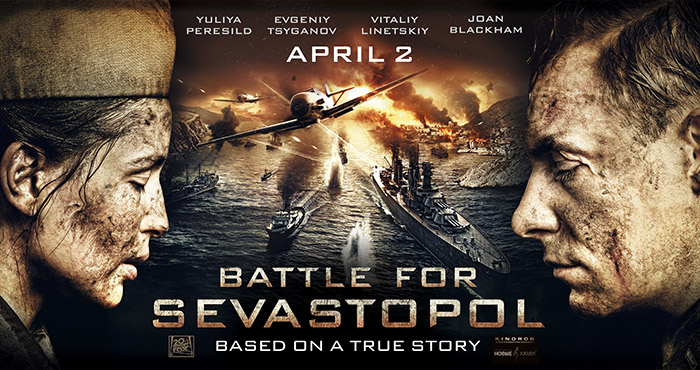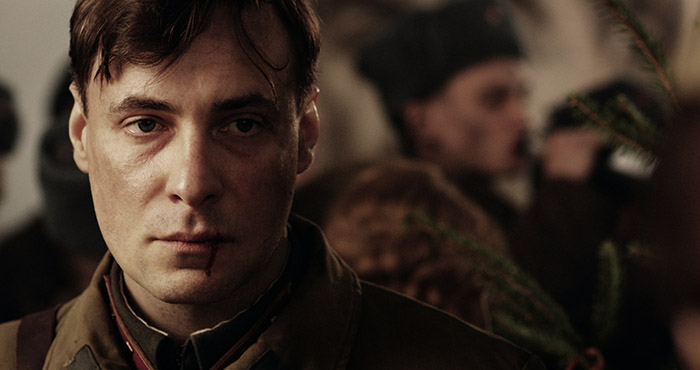《女狙擊手》
發佈時間: 2015-04-19 15:41:11 | 來源: 中國網 | | 責任編輯: 吳婧

《女狙擊手》海報

《女狙擊手》劇照
女狙擊手
俄羅斯、烏克蘭 2015年
編劇:馬克西姆•布達林、謝爾蓋•莫克裏茨克
導演:謝爾蓋•莫克裏茨克
攝影指導:尤裏•科羅爾
音樂:尤金•加爾珀裏納
演員:尤利婭•佩裏希爾德、葉夫根尼•齊加諾夫、尼基塔•塔拉索夫、瓊•布拉克漢姆
製片人:葉戈爾•奧列索夫、納塔利婭•莫克裏茨卡亞、米拉•洛扎諾瓦、烏利亞納•薩維利艾瓦
一個改變歷史的女人的故事
和男人們相戀,這些男人又在敵軍毀滅性的炮火下喪生;和埃莉諾•羅斯福成為朋友;在一場影響二戰結局的大會上做了里程碑式的演説;不斷抗爭,為了生存和愛——一個脆弱的女人能應對這一切嗎?這是柳德米拉•帕夫裏琴科的真實故事,她是傳奇的蘇聯女狙擊手。士兵們帶著她的名字投入戰鬥。而敵人都在追殺她。她在戰場上見到了死亡和折磨,但對她來説最艱難的考驗是愛情,而這愛情會被戰爭奪走……
影片創作經過
烏克蘭電影委員會于2012年,首次有了拍攝一部柳德米拉•帕夫裏琴科傳記電影的想法,隨後由葉卡捷琳娜•科皮洛瓦負責這個項目。本項目描述了兩個國家近代史中一個宏大的時期,需要將兩個國家都聯合起來參與拍攝。雙方製片方都被這個真實的故事吸引,於是攝製工作開始了。2012年,葉戈爾•奧列索夫負責的基諾羅博公司(烏克蘭)和納塔利婭•莫克裏茨卡亞負責的新人民公司(俄羅斯)決定批准本電影項目。
實際攝製工作始於2013年。本片由俄羅斯文化部和烏克蘭電影委員會出資。項目預算為500萬美元。
拍攝工作于2013年秋開始,持續到2014年7月25日。拍攝地點包括塞瓦斯托波爾、巴拉克拉瓦、基輔、敖德薩、卡緬涅茨-波多利斯基。
導演:謝爾蓋•莫克裏茨克:
1991年畢業于俄羅斯格拉西莫夫電影學院,所學專業是攝影指導。為多個劇情片、紀錄片擔任攝影指導。他導演的劇情片包括:《四個年代的愛》(2008)、《教師日》(2012)、《女狙擊手》(2015)。
導演闡述:
對我來説,《女狙擊手》不僅僅是一部戰爭片。當然,片中有許多關於戰鬥、爆炸、飛機墜落和大規模潛艇群的場景。但我的主要目的是拍一部關於人的片子,一個非常堅強的人。同時也是一部關於愛的電影。
儘管戰爭嚴重破壞了影片主角的人生,但諷刺的是,也使她更有活著的感覺,使她能更強烈地表達自己的感情。
本片取材于真實事件,向我們展示了真實的戰爭英雄。我研究了檔案資料,並諮詢了歷史學家,他們向我詳細敘述了柳德米拉•帕夫裏琴科的人生,告訴我敖德薩和塞瓦斯托波爾在那個歷史時期的情況。我們意識到,我們在劇本中其實不需要太多的創作。生活本身已經為我們提供了非常棒的劇本。
我們在徵集演員方面花了很多時間,試圖尋找一位年輕女演員來扮演柳德米拉。尤利婭•佩裏希爾德的表演立刻就讓我印象深刻。我甚至都沒注意到她在我們遴選演員期間已懷孕6個月,還請她拿著一把重型來復槍,做一些身體動作。她就是柳德米拉。
這部電影實際上分三部分。包括“骯髒的”戰爭部分,色調幾乎是黑白;非常混亂和多彩的戰後場景;以及和平時期美國的明朗場景。
當然,我應該説一下拍攝現場的氛圍。我們的團隊是完全國際化的——團隊成員包括俄羅斯人、烏克蘭人、立陶宛人、波蘭人、猶太人……儘管在俄羅斯和烏克蘭關係複雜化的時期,但我們能簡單地將政治排除在談話之外。對我來説極其重要的是,我們團隊內的關係,成為了一種我們國家間關係的原型範例——既親切又充滿創造力。
有個政府官員問我:“你的電影講的是什麼戰爭——二戰還是蘇聯衛國戰爭?”關於這場戰爭的名稱,政治家和歷史學家之間一直存在著許多爭論。
我的立場非常清晰。我的名字是謝爾蓋。我的名字是紀念我叔叔,他死於1945年5月8日。我覺得對於這個問題沒有答案:他所葬身的那場戰爭究竟是二戰還是蘇聯衛國戰爭。
在我們這部影片中,我們探討的話題超越了這些政治爭論。一個年輕女孩應該參戰嗎?你會在殺了人之後還能做一個正常人嗎?對我來説,這部電影是我們雙方歷史的一部分,將我們聯繫在一起,讓我們化解仇怨。
BATTLE OF SEVASTOPOL
Russia-Ukraine, 2015
Script: Maxim Budarin, Sergei Mokrtitsky
Directed by: Sergei Mokritsky
Director of Photography: Yuri Korol
Music: Eugene Galperine
Cast: Yulia Peresild, Evgeny Tsyganov, Nikita Tarasov, Joan Blackham
Producers: Egor Olesov, Natalia Mokritskaya, Mila Rozanova, Uliana Savelieva
Story of a woman who changed the course of history
Falling in love with men who perished in devastating enemy fire, befriending Eleanor Roosevelt, delivering a landmark speech at a conference that influenced the outcome of World War II, constantly fighting in order to live and to love - can a fragile woman handle all this?
This is the true story of Ludmila Pavlichenko, a legendary Soviet woman sniper. Soldiers went into combat carrying her name. Enemies hunted her. She saw death and suffering on the battlefield, but her hardest test was love, which war could take away from her…
How the Project Came to Life:
The idea to film a biopic of Ludmila Pavlichenko was originally conceived by the Cinema Committee of Ukraine in 2012, then headed by Ekaterina Kopylova. The project had to unite two countries in this depiction of a large-scale excerpt of their mutual recent history. Producers on both sides were equally fascinated by this true story, and the work began. The decision to green light the project was made in December 2012 by Kinorob (Ukraine) headed by Egor Olesov and New People (Russia) headed by Natalia Mokritskaya.
Actual production began in 2013. The film was funded by Ministry of Culture of Russia and Ukranian Cinema Committee. The budget is 5 Million US$.
Shooting began in Fall of 2013 and lasted until July 25th, 2014. It took place in Sevastopol, Balaklava, Kiev, Odessa, Kamenets-Podolsky.
Sergei Mokritsky, director:
Graduated as director of photography from Russian State Institute of Cinematography in 1991. Worked on multiple feature and documentary films as director of photography. Feature films, made as director, include: “Four Ages of Love” (2008), “Day of the Teacher” (2012), “Battle of Sevastopol” (2015).
Director’s Statement:
For me “Battle of Sevastopol” is not only a film about war. Of course, there are plenty of visual scenes with combats, explosions, falling planes, and massive submarines. However, my main goal was to make a film about a human being. A very strong human being. And about love.
Although war severely wounded our protagonist’s life, it also, ironically, helped her feel more alive and helped her manifest her feelings stronger.
The film is based on true events and it shows us real war heroes. After studying the archives and consulting with historians who told us in details about the life of Ludmila Pavlichenko and that historical period in Odessa and Sevastopol, we realized that we don’t need to invent much in the script. Life itself has written a fascinating script for us.
We had an extensive casting period when we tried to find a young actress who would play Ludmila. I was impressed at once by Yulia Perisild’s performance. I did not even notice that she was 6 months pregnant during casting, and asked her to carry a heavy rifle and perform physical exercises. She was Ludmila.
Visually the film is divided into three parts. The “dirty” war, which looks almost black-and-white, a very chaotic and colorful image of pre-war scenes and glossy image of peaceful United States.
I should, of course, mention the atmosphere on set. Our team was purely international – we had Russians, Ukranians, Lithuanians, Polish, Jewish… Despite the complicated period in the relationship between Russia and Ukraine, we simply excluded politics from all our conversations. It was extremely important to me that the relationship within our team became a sample prototype for the relationship between our countries – amicable and productive.
One government official asked me: “What war is your movie about – World War II or the Great Patriotic War?” There is a lot of ongoing debate between politicians and historians about these two titles.
My position is very clear. My name is Sergei. I was named in honour of my uncle who died on May 8th, 1945. I don't think there is an answer to the question, in which war he perished – World War II or Great Patriotic War.
In our film we discuss topics which are above these political debates. Should a young girl be at war? Can you kill a human being and remain a human being yourself? For me this film is part of our mutual history, which bonds us together and restricts us from becoming enemies.
| 責任編輯: 吳婧 |